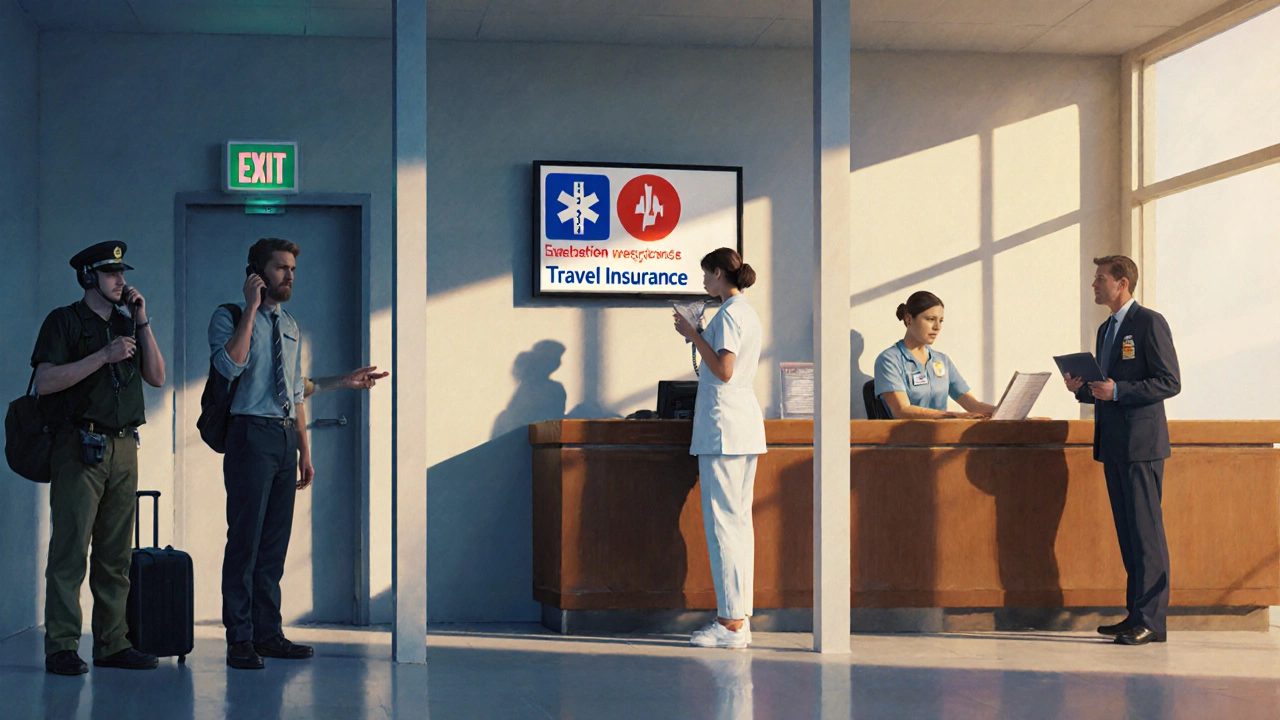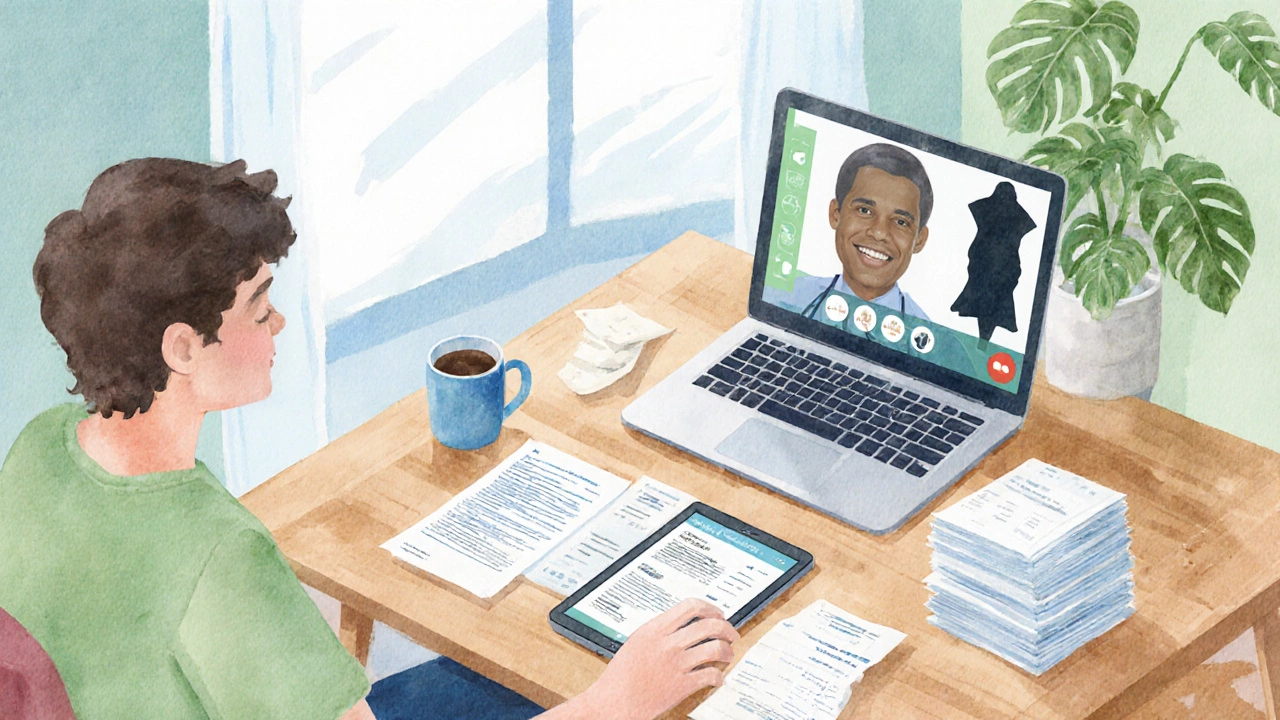
Travel Insurance Coverage Calculator
Travel Insurance Coverage Calculator
Estimate your medical coverage and potential out-of-pocket costs for your international trip. Based on your travel details, we'll calculate expected coverage limits and potential expenses.
Enter your travel details and click "Calculate Coverage" to see estimated medical coverage and potential out-of-pocket costs.
Key Takeaways
- Act fast: know the three‑step emergency routine before you travel.
- Check your travel insurance policy for coverage limits, evacuation, and pre‑existing condition clauses.
- Keep a list of local emergency numbers, your nearest embassy, and your insurer’s 24‑hour hotline.
- Document every expense, prescription, and medical report to speed up claims.
- Understand when to stay local and when to request medical evacuation.
Understanding a medical emergency abroad
When you find yourself in a medical emergency abroad is an unexpected health crisis that occurs while you are outside your home country, panic can set in fast. Emergencies range from severe allergic reactions and broken bones to heart attacks or sudden infections. The common denominator is time: the quicker you follow a proven routine, the better the outcome.
Many travelers think that a local clinic will handle everything, but the reality varies by country. Some nations have state‑run hospitals with excellent standards, while others rely on private facilities that may charge steep fees. Knowing the type of care you’re likely to encounter helps you decide whether to stay put or call for evacuation.
Immediate actions: the three‑step emergency routine
- Secure safety and call local emergency services. Dial the country’s emergency number (115 in the UK, 112 in most of Europe, 911 in the US, etc.). If you’re unsure, ask a hotel staff member or use a translation app.
- Notify your travel insurance provider. Most policies have a 24‑hour hotline. Provide them with the location, nature of the emergency, and any preliminary diagnosis.
- Contact your nearest embassy or consulate. They can offer guidance on reputable hospitals, arrange translators, and sometimes assist with evacuation logistics.
While waiting for help, keep a record of the time, symptoms, and any medication taken. This snapshot becomes vital for doctors and insurers later on.

Using travel insurance effectively
Travel insurance is a short‑term policy designed to cover medical costs, loss of luggage, trip cancellation, and sometimes evacuation when you’re away from home. To make it work:
- Know your coverage limits. A typical policy might cover up to $500,000 in medical expenses, but evacuation can cost $50,000‑$100,000 extra.
- Check pre‑existing condition clauses. Some policies exclude them unless you purchase a rider.
- Understand the claim process. Most insurers require a written report from the attending physician, itemized invoices, and a copy of your passport.
- Keep receipts in real time. Use your phone’s camera to scan bills; email them to yourself for easy retrieval.
If you have an existing international health insurance plan, compare its terms with your travel policy. Often the travel insurer handles the immediate on‑the‑ground coordination, while the international plan picks up the bulk of the bill later.
When to call your embassy or consular services
Embassy assistance is consular support offered by your home country’s diplomatic mission, ranging from legal advice to medical referrals. They’re particularly useful when:
- You don’t speak the local language and need a translator for medical paperwork.
- The local hospital requires a cash deposit before treatment, and you need guidance on safe payment methods.
- There’s a risk of political unrest that could affect your safety while receiving care.
Most embassies have a 24‑hour emergency line. Keep that number in your phone, alongside the local emergency services number.
Medical evacuation vs. local treatment
Medical evacuation is the transport of a patient to a medical facility that can provide a higher level of care, often across borders, typically via air ambulance. Evacuation becomes the best option when:
- The nearest hospital lacks intensive‑care capabilities.
- The injury or illness requires specialized surgeons not available locally.
- Travel insurance explicitly covers evacuation and you can obtain a written “medical necessity” statement from the attending doctor.
If the local facility meets the required standard, stay there. Evacuation can add days of travel, higher costs, and extra paperwork.
Documentation you’ll need for billing and follow‑up
After the crisis subsides, the paperwork continues. Collect the following items before you leave the hospital:
- Doctor’s discharge summary with diagnosis codes (ICD‑10).
- Itemized invoice covering consultation, medication, lab tests, and room charges.
- Proof of payment (receipt, credit‑card statement).
- Prescription details, especially if you need the medication at home.
- Copy of your passport page showing entry/exit dates (useful for insurance timelines).
Store these documents digitally in a secure cloud folder. When you file a claim, insurers often request PDFs within 30days.

Cost‑management tips and common pitfalls
- Don’t self‑medicate with local drugs unless a doctor approves it. Some over‑the‑counter medicines can interact dangerously with prescriptions you already take.
- Avoid cash‑only hospitals unless you have a backup plan. Paying in advance can deplete your travel budget; always ask about insurance billing.
- Check whether your credit card offers emergency medical assistance. Many premium cards cover evacuation up to a certain amount.
- Know the limits of public health systems. In some countries, public hospitals are free for residents but charge tourists steep fees.
- Plan for follow‑up care at home. Arrange a telehealth consultation with your primary doctor to review discharge notes and adjust medications.
Coverage comparison: Travel insurance vs. International health insurance vs. Domestic policy abroad
| Feature | Travel Insurance (short‑term) | International Health Insurance (expat plan) | Domestic Health Policy (coverage abroad) |
|---|---|---|---|
| Typical coverage limit | $500,000 - $1,000,000 | $1,000,000 - $5,000,000 | Often limited to $50,000 - $100,000 |
| Medical evacuation | Usually included up to $100,000 | Included, often unlimited | Rarely covered |
| Pre‑existing conditions | May require rider, often excluded | Generally covered after waiting period | Depends on provider, often excluded |
| Premium cost (per week) | $30 - $80 | $200 - $500 (annual) | Same as domestic plan; no extra fee |
| Claim processing time | 7 - 30 days | 30 - 60 days | Varies, often slower |
Next steps after you return home
Once you’re back, follow these three actions:
- Schedule a follow‑up appointment with your primary care physician and bring all discharge paperwork.
- Submit any outstanding insurance claims; attach digital copies of receipts and the doctor’s report.
- Update your travel health plan for future trips based on what worked and what didn’t.
Reflecting on the experience helps you refine your emergency kit, emergency numbers list, and insurance choices for the next adventure.
Frequently Asked Questions
Do I need travel insurance if I already have a private health plan?
Many private plans limit coverage to the country where you bought them. Even if they offer some out‑of‑country benefits, they often exclude evacuation and may cap reimbursements at a low amount. Adding a short‑term travel policy fills those gaps.
What number should I dial for emergency medical help in most countries?
The universal European emergency number is 112, which works in most EU nations and many other regions. In the United States and Canada, use 911. Always check the specific number for the country you’re visiting before you travel.
Can my embassy pay for my hospital bill?
Embassies rarely cover medical costs directly. Their role is to provide information, help you locate reputable facilities, and sometimes assist with communication. The financial responsibility usually stays with you or your insurer.
How long does a medical evacuation usually take?
Evacuations can take anywhere from a few hours (if an air ambulance is on standby) to 48hours when paperwork, flight clearance, and specialist coordination are required. Having a pre‑approved evacuation clause speeds up the process dramatically.
What should I do if I lose my passport during a medical emergency?
Report the loss to the local police, then contact your embassy to obtain an emergency travel document. The embassy can also liaise with the hospital to verify your identity for billing purposes.